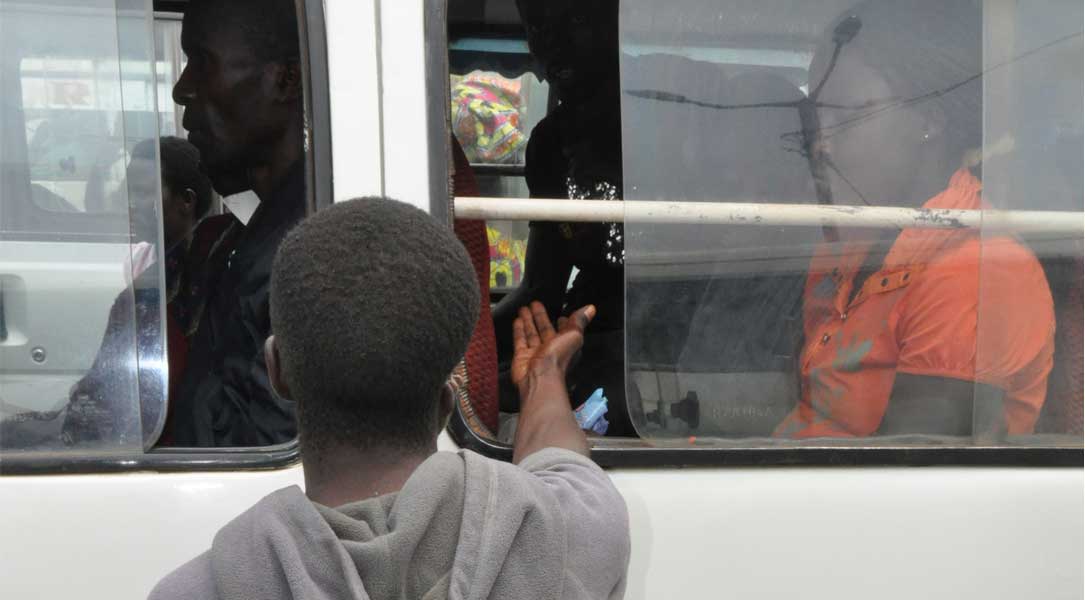Life teaches a lot of lessons and my favourite so far has been that; ‘we reap what we sow’.
You may have heard of it as a proverb, but I’ve got it as a lifetime lesson.
Generation ‘z’ calls it ‘karma’, and they termed her a ‘bitch’, because she serves you what you give.
Knowing that, I try as much as I can, to do good, so that good comes back to me: helping, being one of them.
Times have however made it hard to give of late; the economy aside, trust has also become an issue.
As I go about my day to day activities within Kigali, on many occasions, I’ve come across people collecting funds and material things in the name of ‘helping the vulnerable’, particularly those in hospitals.
In their words, “they help patients acquire basic needs, pay hospital bills, and in some cases, obtain medical insurance”.
I’m always tempted to contribute, but for some reason I hold back: It would break my heart to give a donation and it doesn’t reach the intended destination.
This ‘mistrust’ prompted me to reach out to some of the individuals collecting funds, in a quest to have my ‘doubts’ cleared.
The ‘proclaimed’ volunteers
In Kimironko bus park, is where I found Dusabimana Maria, a volunteer affiliated to ‘Ihundorihuza’ organization.
According to Dusabimana, the organisation engages in a wide range of activities all revolving around provision of support to patients at ‘Muhima’ hospital; these include facilitating item delivery and offering prayers.
She notes that her inspiration to join the organisation comes from a personal experience and that she has been working with Ihundorihuza for a year, however out of seven days in a week, she’s only fully engaged for three days, dedicating the remaining days to activities that support her sustenance.
“I vividly remember the support rendered to me a year ago at Kibagabaga hospital while I was taking care of a patient. The emotional resonance inspired me to inquire about the organisation behind these efforts which compelled me to align myself with their charitable initiatives”, she remarked.
Asked how I can trust that she delivers the donations to the respective personnel, Dusabimana informed me that they ensure they receive official hospital documents confirming receipt of items. Furthermore, they capture picture moments with the patients everytime they take donations.
Israel Mugabonejo on the other hand alleged working with ‘Abanyembabazi charity organisation situated in Kicukiro. He said that their work involves collaborating with hospitals such as; Nyamata, Muhima, CHUK, and Kibagabaga.
Israel’s ‘organisation’ issues them a signed delivery note every time they make deliveries to hospitals, which according to him, earns them remarkable trust from the public as they go about their field operations.
Additionally, to ensure their sustenance, a 10% commission is granted to them from the collected resources by the organisation, and the remaining distributed to the needy.
Israel stressed that, ‘participating in charitable work is an incredibly rewarding endeavour as it aids the recipients faster recovery and fosters a sense of humanity among communities.
“When patients witness strangers extend a helping hand, it brings them relief and renews their faith in the goodness of humanity”, he exclaimed.
Neither of the volunteers has received any challenges in the course of their work, a thing they attribute to transparency in their charity endeavours.
“When our actions are conducted responsibly, authorities are supportive, not restrictive. Our commitment to noble causes is a shield against potential hindrances”, explained Israel.
Does the help reach the said recipients
With the help of my editor at IGIHE, we reached out to the mentioned hospitals to confirm the ‘allegations’ from the two volunteers;
Dr.William Rutagengwa, Director General of Nyamata Level II Teaching hospital informed us that neither ‘Abanyembabizi’ nor ‘Ihundorihuza’ charity organisations are registered among those that offer support to their patients.
“When an organisation wants to support patients at the hospital, they write to the administration and they get authorization. Unfortunately, none of those organisations appears in our records”, he said.
Leonite Uwiragiye from Muhima hospital alleged that the mentioned organizations are not known to them. She instead acknowledged ‘Solid Africa’ as one of the charity organizations they work with.
Where does Israel and Maria take the proceeds they collect from the public
We contacted Israel again who provided his manager’s contact as proof that their organization is credible.
When contacted, Akimpaye the manager of ‘Abanyembabazi charity organisation’ attested to their work, alleging that even Kicukiro authorities have knowledge about their operations.
Unfortunately, we were not able to get an official from Kicukiro district to confirm whether they are aware of ‘Abanyembabazi Charity Organisation’ operations.
Dusabimana Maria on the other hand could not be reached by press time.
Public’s take on Israel and Maria’s activities
Felix Muyisenge, a resident of Kimironko, a Kigali suburb terms the act of soliciting for funds in the name of helping the vulnerable as a “smart strategy of scheming people off their money”. He hence asked authorities to intervene by either stopping those involved or regulating their operations to ensure that the funds reach the said beneficiaries.
Chalene Furaha, a university student in Mount Kigali University Rwanda(MKUR) says she has never offered any of those people money simply because of their appearance.
“To be honest, I’ve never offered them any assistance. Most of the so called volunteers I’ve come across look like they need help themselves, which makes me wonder if the money they ask for is not for their own benefit”.
She however acknowledges what they do as a ‘good gesture’ and suggests proper identification of the personnels involved as a form of credibility.
“If they’re truly sincere, there should be some form of verification or registration of their specific organisation which would lend more credibility than operating privately”, she stated.
Tuyishimire Nadine, a university student in Kigali, appreciates the work the volunteers do, saying it takes humanity to help others.
“I thank those who go out of their way to help others with whatever they have. Any act of kindness however small is never wasted”, she said.
Nadine however thinks that the government should work hand in hand with those volunteers so that they get to collect enough, for the people in need.
“I have seen that when the government is in charge of things, people fully engage and are supportive unlike when its individuals because they are always seen as scammers hence people refrain from giving them donations”.
“I love what they do for other people and on many accounts, I’ve transferred money to those people’s mobile money accounts”, said Lydia Umuhoza, adding that, “It has never crossed my mind that they may not deliver the assistance, I hope they do”.
What the Rwandan law and city of Kigali says about begging
Tombola Felicie, the public relations officer at City of Kigali in Rwanda, said that what those individuals are doing is similar to begging and according to their rules, begging is highly condemned.
The Rwandan law on begging
“A person who commits begging shall be liable to a term of imprisonment of 8 days but less than 6 months to 1 year(Article 690). The article stresses that even a group of beggars shall be liable to the penalty under paragraph 2 of this article.
Additionally, any beggar who uses threats, enters a residence or its compound without the consent of the owner, pretends to be ill or disabled, adopts a behaviour that reduces him/her to a pitiful state shall be liable a term of imprisonment of 6 months to 1 year.
Begging is categorised by the National Rehabilitation Service(NRS) Rwanda under ‘forms of delinquency’ (conduct that does not conform to the legal requirements or moral standards of the Rwandan society).
“There’s no consolidated set of laws against delinquency in Rwanda simply because there is no single crime or behaviour called delinquency, however, most of the delinquent behaviours are managed with reference to law No. 01/2012/OL of 02/05/2012 instituting the penal code”, NRS.
In addition, a few non-criminal anti-social behaviours are treated with reference to existing orders and regulations such as the city of Kigali instructions; No. 44 of 02/11/2015, instituting and regulating the mandate and the functioning of Kigali rehabilitation and transit centre.
Forms of delinquency in Rwanda and their penalties
Drug/substance abuse; characterised by a destructive pattern of using a substance that leads to significant problems or distress, Article 593 of the penal code states that; growing, selling, transformation, transportation, storage and consumption of narcotic drugs are prohibited, except in cases and conditions specified by law.
Prostitution; defined as the “involvement by either man or woman in sex work as an occupation in exchange for consideration. Article 205(paragraph 2) sets stringent conditions imposed on any one engaging in prostitution while paragraph 4 reminds that both sex workers and their clients are liable to the same punishments.
Vagrancy/homelessness; instances where a person has no place of residence, regular occupation or profession in the way that it impairs public order. Section 5, Article 687 states that a person who commits vagrancy shall be liable to a term of imprisonment of two months but less than six months and a fine of ten thousand to one hundred thousand Rwandan francs or one of these penalties.
Drunkenness in the public; any person found in the state of drunkenness on the road, playground, public ways, drinking places, sports places or any public place shall be liable to a term of imprisonment of 8 days to 2 months and a fine of 20,000 to 100,000 Rwandan francs or one of these penalties.
Furthermore, if the owner of the drinking place or his employees allow on their premises drunk persons and give them more alcoholic drinks shall be liable to an 8 days to 2 months term of imprisonment and a fine of 50,000 to 200,000 Rwandan francs or one of these penalties.
Theft; the law defines theft as any fraudulent withdrawal or use of something belonging to another person. According to the law, theft can be carried out with or without violence. Article 300, penal code states that “any person who commits theft without violence or threat shall be liable to a 6 months to 2 years term of imprisonment and a fine of 2 to 5 times the value of the stolen property or one of these penalties.
Street vending; although not punishable under the existing business laws or the penal code, street vending is prohibited under the city of Kigali instructions on the establishment and functioning of the Kigali city rehabilitation and transit centre adopted in November 2015.





